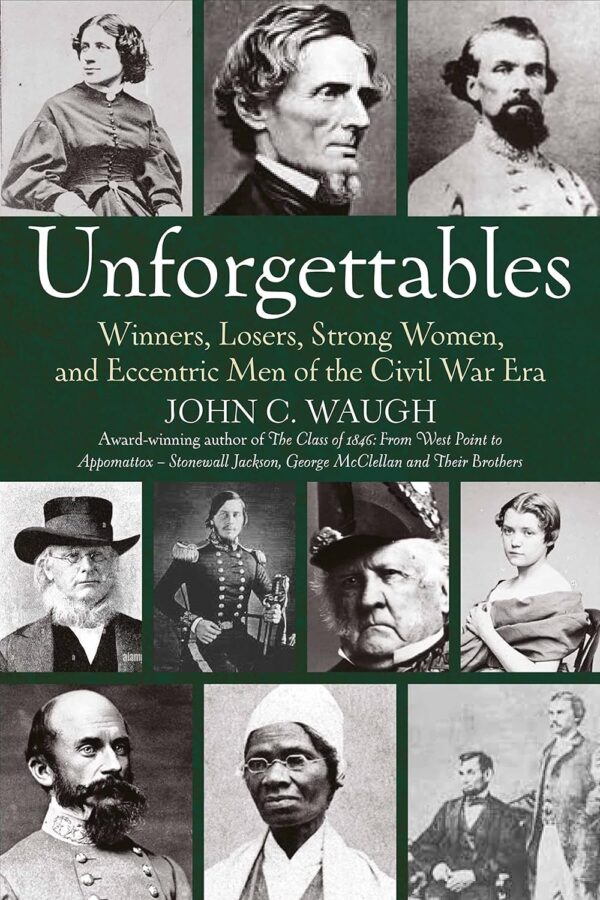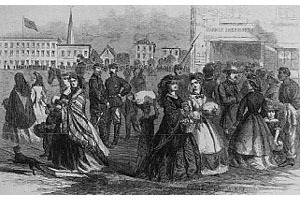
Unforgettables: Winners, Losers, Strong Women, and Eccentric Men of the Civil War Era by John C. Waugh. Savas Beatie, 2024. Paper, ISBN: 978-1611216653. $22.95.
John C. Waugh is a seasoned Civil War historian and the author of twelve previous volumes about the war, including The Class of 1846: From West Point to Appomattox. In his latest book, Unforgettables, Waugh draws short biographical sketches of the characters who have stood out to him personally during his many decades of study, including the “Great Triumvirate” of Henry Clay, John C. Calhoun and Daniel Webster (whose conflicts and compromises over the extension of slavery set the stage for Civil War) as well as presidents, first ladies, writers, and newspaper magnates—all of whom will be familiar to the well-versed reader.
The book contains a methodological argument even if it does not necessarily bring forward a historiographical intervention. In the introduction, the author states that his intent was to hopefully “hook a few non-believers on the undeniable drama that is history” by presenting the Civil War era as driven by the personalities and choices of compelling characters. His intent is pure, and the biographical sketches are indeed compelling and well-written. He’s reaching for those who would not otherwise consider picking up a history book, and with this short and punchy edition, he’s likely to hit his target.
Waugh’s framing, however, makes an unfair swipe at his peers in the field of Civil War history. “There is only one reason everybody doesn’t love history,” Waugh opines, “because it isn’t taught or written correctly.” He continues: “when done properly, as a great dramatic story driven by bewitching characters, it is everybody’s favorite subject.” The point is taken, but the debate over whether history is driven by individuals, or else those slippery structural externalities historians collectively call “context,” is itself as old as history. Besides that, our recent debates over the practice of history have been less about character versus context than they have been about which characters and whose perspectives are told.
This is salient, because Waugh’s cast of “unforgettables” largely excludes African Americans, whose futures hung in the balance throughout the era. There are only two profiles of Black individuals here (Frederick Douglass and Sojourner Truth), and they consume only eight of more than 200 pages. Forgotten by omission are enslaved people, or those Black men and women who risked life and limb to fight for their freedom and the freedom of their families.
None of this criticism, however, takes away from what the author has done well here. Given that the cast of characters was chosen through lens of figures who grabbed the personal interest and attention of the author, it should be acknowledged that Waugh authoritatively conveys his often profound and valuable understanding of each of the historical figures portraited within the book. It was a fun and engaging read.
But just as there is a valued place for books like Unforgettables in the field of Civil War studies, let us remember that there is an equally valuable place for other approaches, too. There is a place for scholars trying to reconstruct the lives of the truly forgotten. A place for those who are trying to reconstruct flesh and bone from the bare scraps of evidence we have for the lives of the people at the margins of Civil War society. A place for public historians who reconstruct army movements on the battlefields. A place for historians who study ledger books and economic systems. The true beauty of history, if we allow it, is that there’s a place for it all—even the things Waugh pans as “bad history,” “full of boring dates, facts, places, names, battles, wars, treaties, [and] acts of Congress.”
This is so important to remember, because the Civil War remains one of the few subfields of U.S. history in which academics, public historians, popular authors, and knowledgeable hobbyists have all managed to coexist. Books about the Civil War get published by the truckload from a wide range of authors, and the reading public continues to gobble them up. This is something truly beautiful, increasingly rare, and worth preserving. And preserving it means extending a little grace and courtesy to those who see and do history differently, acknowledging the value of what they contribute, and conceding that there’s more than one way to skin a mule and make “good history.”
Aaron David Hyams teaches U.S., Texas, and southern history in the Department of History at Sam Houston State University.

